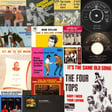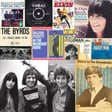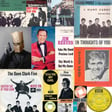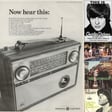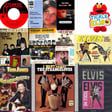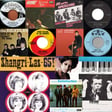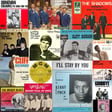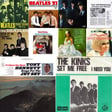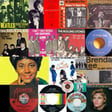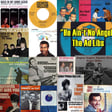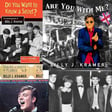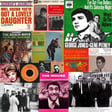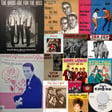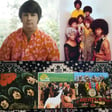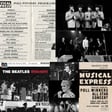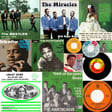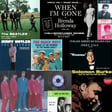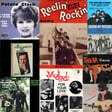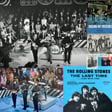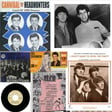Become a Creator today!Start creating today - Share your story with the world!
Start for free
00:00:00
00:00:01

August 1964 (side C)
Side three of our four-sided look at August 1964. Beatlemania returns with a vengeance as the band returns to American shores and their first film hits theatres in the states. However, Ray Charles, the Little GTO and Tony Bennett and Motown have their own chart hits! Create your podcast today! #madeonzencastr
Recommended
Transcript
The Beatles' Morale Boosting Chant
00:00:00
Speaker
The Beatles had this chant, John Paul and George, and probably then Stuart and Pete had this chant when things weren't going well, which in their world wasn't very often because mostly it was an upward trajectory, but nonetheless, sometimes you they would have a bad night or the gig didn't work properly or the amps broke or whatever. I say, where are we going, fellas? And they'd go to the top, Johnny. And I'd say, where's that, fellas? And they'd say to the top of most of the papamos. And say, right. And we'd all sort of cheer up.
00:00:31
Speaker
Where are we going, Johnny? Straight to the top, boys. Oh, yeah? Where's that? The tapremos to the papremos.
00:00:45
Speaker
Welcome to side C of our foresight odyssey for August of 1964.
Cashbox vs Billboard: Song Responses
00:00:51
Speaker
I'm Ed Chin. I'm kiddo tool. I'm Martin Crabell. We are now on to the American Heart side speed. We're doing a Cashbox show this month. Yes, we are looking at Cashbox for the month of August, which is always interesting because it's a little different from Billboard, but it's always interesting to look at the differences in you know where the singles are. And so we decided to switch it up a bit for this episode.
00:01:22
Speaker
You know, in the future when we do Cashbox, I'm going to pre-write my responses to the songs Cashbox style. There you go. This one's a stinker and a clinker.
00:01:41
Speaker
It's a marverific tune.
00:01:46
Speaker
All right, so we start with the first week in August.
Beatles Tour Ad and Arthur Fiedler's Cover
00:01:51
Speaker
Before we get into the charts, I did want to mention there is an ad in the issue for the Build Black combos, Little Queenie. And what do they tell you us? They tell us that they are featured on the new Beatles tour. Oh, boy. Nice.
00:02:10
Speaker
That same ad also features a mention of the Nashville teens with Tobacco Road with England's hottest record. but I don't know if it's quite England's hottest record, but okay, it got a mention. It would be if it got late.
00:02:25
Speaker
did And there is an editorial which includes this wonderful statement. Anything seemed to go when the Boston Pops under elegant Arthur Fiedler made single sales hay with an adaptation of The Beatles, I Want to Hold Your Hand. Never the Twain Shall Meet for good music and the top 10 sound. The joke is on the fellows without a sense of humor or the creative sensibility to know that opposites attract. And we did review the Fiedler disc last month.
00:02:55
Speaker
Indeed. And that was a big deal. I mean, Arthur Fiedler got a lot of flack back then by some critics for covering the Beatles. You know, it was kind of a jab at some of the critics who said, you know, how dare he do that? And so I think that was saying, hey, smart to cover modern music and bring those sounds together of the orchestra and pop music. And he was smart to do it. Yeah. So basically, no no no no no ah Well, it's interesting that it's coming from the editors at Cashbox rather than the marketing folks or anyone associated with Fiedler. Yeah, true. All right, so we start in on the week of August 1st.
The Beatles' Dominance on Cashbox Charts
00:03:40
Speaker
At number one is Hard Day's Night.
00:03:58
Speaker
At number 30 is Ain't She Sweet. At number 48 is I'll Cry Instead. I got every reason on earth to be mad. Cause I just lost the only girl I had.
00:04:21
Speaker
If I could get my way I'd get myself locked up today But I can't, so I'll cry instead At number 51 is I Should've Known Better The Beatles version of I Should've Known Better, not the Nashville version No, no, no
00:04:55
Speaker
Edit number 67 and I love her. I give her
00:05:11
Speaker
You'd love her too. I love her. That's all four sides. So unlike what George said that what on so number i i know because they couldn't just release everything on singles. Well, in America, Capitol could. Yes.
00:05:32
Speaker
Never waste a money making opportunity. I think they learned from VJ. They might not have done this had they not seen that, oh, we can have all these songs coexist. And they do. That's right. The Beatles were that big at the time.
00:05:48
Speaker
Alright, at number 74, a tear fell by Ray Charles. A good vocal. ah As we always say, it's a Ray Charles a vocal. I really don't care for the backing singers, the Gene Lowell singers. They just don't match with Ray Charles at all. I really would have preferred only the vocal and piano with maybe some minimal backing.
00:06:11
Speaker
Singers, maybe just one or two people behind him. That would have been much more appropriate. This has a real country sound to it. This could have been on his country album.
00:06:51
Speaker
Solomon Burke did a version of the song in 1966 which is still overproduced but it's much better than this version. I completely agree. Vocal's great. It's Ray Charles, what do you expect? But the background singers are way, way too much. Also over range. I like the strings either way down in the mix, maybe even not at all. Just have him on the piano, minimal background singers, as you said. Maybe just a trio. Again, we've talked about this so many times with Ray Charles. It's Ray Charles, incredible voice.
00:07:25
Speaker
and incredible piano playing. Why drown him out with the strings and backing singers? I mean, it's kind of the same thing we've been saying about Tony Bennett. Tony Bennett is at his best when he's got a trio, you know, just a little combo with him. yeah Ray Charles is at his best with just a little combo and maybe the Raylettes. I mean, you know, there's certainly room for them as well. These better songs from Ray for sure.
00:07:47
Speaker
Yeah. Is it quoting my darling Clementine in there? You mentioned the country feel. It sounds like it was just a little sample of my darling Clementine. A bit, yeah. Yeah.
00:08:15
Speaker
It's from a concept album,
Ray Charles' 'A Tear Fell': Overproduction Critique
00:08:17
Speaker
you know, this is Sweet and Sour Tears. Every single one of the songs had something to do with crying, okay which is a weird concept. if but Sweet and Sour Tears, every song has cry or tears or something like that in the title.
00:08:35
Speaker
Except what you might not expect is that it doesn't mean that this is a sad album. It's not all slow Some of it is like um I cried for you Which is more upbeat and more like I cried for you now you cry for me Cry me a river is great version of cry me a river on here. So this is a lot of fun. It's not sad and weepy not a hundred percent it is but I yet another concept album. I didn't really care for this much. Ray is better when he's got as little going on in the background as possible. Agreed. So this song, A Cheerfel, was written by Eugene Randolph and Dorian Burton, first released in 1956. The best known version was recorded by Theresa Brewer that same year, which peaked at number two in the UK and number five in the US.
00:09:27
Speaker
the b-side tour single bow weevil was also a hit in the u.s reaching number 17 on the pop truck At number 75, I've got no time to lose by Carla Thomas, a stack single, a really nice soul single, ah good lead, good backing vocals, which may be just up in the mix ever so slightly too much. Great guitar, great drums by Steve Cropper and Dini Parker. Yeah, Steve Cropper, incredible guitar. Carla Thomas' vocal is a standout here.
00:09:58
Speaker
Wow, I mean she sings this like she means it. Just incredible.
00:10:32
Speaker
Dini Parker wrote this. Starting in 1963, she worked for Stacks as a singer, songwriter, and later the director of publicity, artists, and community relations. In 1963, a high school student named Dini Parker won a contest that earned her an audition at Stacks Records.
00:10:55
Speaker
I wanted to emulate Carla Thomas' career because she was the high school star and I thought, well, if she can do it, perhaps I can do it as well. My biggest hit was My Imaginary Guy. It was a regional success, in part because our families bought a lot of records. You know, I didn't have the talent, I didn't think. I never thought that I was a great singer.
00:11:17
Speaker
And I had an opportunity to learn how to write. I was a mediocre writer. ah And so I thought, yeah I better find, i bet I better get some formal education in something that I can do and bring some value to Stax Records. And that is precisely what I set out to do.
00:11:34
Speaker
Dini became Stax Records' first head of publicity and artist relations. With on-the-job training and the encouragement of Stax's owners, Jim Stewart and Estelle Axton, Dini became an integral part of the Stax music family.
00:11:50
Speaker
She currently serves as president and CEO of the Soulsville Museum in Memphis and she's a member of the boards of the Rock and Soul Museum, played again Memphis, and the Tennessee Arts Commission. So she's still active and I was so glad you did this Ed. You sent us a link to the demo that she recorded for this song and with the original vocals that Deanie Parker recorded while I prefer Carla Thomas's. I mean, she's got the emotion and the incredible power, but I thought Parker's vocals were nice on it. Very gospel influence. And on the demo, Steve Cropper's guitar is even more prominent, but the drums are more subtle. So very interesting to hear the comparison in the demo and final studio version.
00:13:24
Speaker
Great song, incredible vocal, and the usual stacks, amazing back in music. Is it all of the MG's on this or is it just Steve? I'm not sure if it's all because I don't know if I heard an organ on here. No. Yeah, because I don't know if Booker T was on this.
00:13:43
Speaker
at number 78 and I love her by George Martin the George Martin version which we have covered but we do want to just include that this was included on Martin's Parlophone album off the Beatle track and the EP Music from a Hard Day's Night by the George Martin Orchestra released on the 19th of February 1965.
00:14:34
Speaker
And then it was also on the American hard days, nights soundtrack. I mean, it's okay. It's not some of George Martin's best work. No. at number 82, Sailor Boy by The Chiffons, written by Jerry Goffin and Russ Teitelman. We're gonna talk about Russ Teitelman more in a minute here. This song, it's okay. It's kind of a mix between a standard girl group song with the World War II, Oh My Man Should Come Back To Me lyrics. Okay?
00:15:37
Speaker
I found it odd. Love the harmonies. That was the best part of the song. Otherwise, yeah, very odd throwback song for 1964. It does sound like kind of a 40s wartime track, you know, in terms of the lyrics.
00:15:54
Speaker
This can't compare to one fine day or he's so fine. There just wasn't a hook here. You know, there just wasn't any memorable part of the track that was anything that lingered in the mind after you heard it. No hook whatsoever. But the harmonies were great. The ladies just sounded great, but just not a memorable track whatsoever. The great vocalist, but it's just there's no hook. There's no nothing to it at all. Yep, absolutely. Well, we won't make a snarky Jerry Goff and comment. Right. but We will not. Yes. We will imply one, but we won't make one. That's right. Now, as to Russ Tylerman, he is a name that beetle people know before we get to his Beatles connection. He worked with Brian Wilson. He wrote for the monkeys. He was also a musician and he played on the captain beef heart album safe as milk. which Nice. As anyone who is familiar with the photos of John Lennon at
00:16:54
Speaker
his home hanging out with Cynthia, he had the Captain Beefheart's Safe as Milk sticker on his dresser. Yes he did. So he was obviously a big fan of that record. So not only that, Russ Teitelman would go on to co-produce the George Harrison album. Classic.
00:17:15
Speaker
Brilliant. I love that album. Same. so Just one example of how Russ Teitelman would influence that record. When we first got together in LA, George had a cassette of most of the songs, many that he had written in Hawaii. Danny, we want a copy of that cassette.
00:17:31
Speaker
Yes. Yup. It included just the guitar part of Your Love Is Forever, which I think is one of the most beautiful songs that George ever wrote. So I said to him, you have to write a lyric to this. And he did. Really nice photos of George and Russ Teitelman hanging out in Hawaii. They were apparently friends and while they didn't work too much more together, they did work together in the future. and I was there for like two and a half months and it passed, you know, kind of living in the house and
00:18:00
Speaker
yeah yeah but probably We'll probably leave some of those stories out. but and you know unless want to share one
00:18:10
Speaker
i'll tell you after this short does Does he brush his teeth? i mean Did he brush his teeth normally? i mean you know I'm just kidding. i think so At number 85, the girls are right with
'GTO' by Ronnie and The Daytonas: Car Song Nostalgia
00:18:23
Speaker
me by the Temptations, which we've already covered. Drummer Whitfield and Eddie Holland. Any additional things we need to say about this? We do have a Beatles connection, but before we get to that, you want to say anything more about this song? not No. The Beatles connection, there's two actually. The Temptations' 1970s song, Ball of Confusion, includes the lyrics, the Beatles' new record is a gas.
00:18:47
Speaker
Yes. And then, well, if you are familiar with the Beatles 1969 Christmas record, it starts with Christmas bells. Where did those bells come from? Kenny Everett sampled them from the Temptations version of White Christmas. Oh, Wow. I forgot about that.
00:19:47
Speaker
happy this was at number 86 george martin's cover of this boy ringo's theme which we have previously covered at number 87 eight no use by major lance which we have also previously covered at number 91 Darling It's Wonderful by Dale and Grace, the Nashville sound full force. I like the guitar, but I hate those backing vocals. It's derivative, but not as derivative as the last two records from Dale and Grace. It's slightly better than an average record. Yeah, it's okay.
00:20:48
Speaker
I agree, the backing vocals get very annoying, repeating everything they say. I like the twangy guitar. It's a bit reminiscent of I'm leaving it up to you, particularly in the rhythm and piano. Still a bit swamp poppy. But only a little bit. Not as obviously as some of the others, including I'm leaving it up to you. That's very swamp poppy.
00:21:12
Speaker
including on leaving it up to you. You have the three records which were basically the same record. This is different. It just has echoes of leaving it up to you. Exactly. It has hints of swamp pop. It's okay. Still like leaving it up to you the best of that. I like, you know, their harmonies on that. The lyrics, much catchier. This one is not as memorable. If you put this much syrup on your pancakes, you'd be sending them back because they're just full to pieces.
00:21:43
Speaker
as soon as it started I actually oh god it's these two again. Either do it as a straight country song without the strings or do it with less production. It was just too much going on there and the backing vocals I really did not like. It's just too much.
00:22:01
Speaker
ye Now, it's interesting that you mentioned the Swamp Pop because the writers of this song, or at least the accredited writers because there are questions about that, were Sam Montel and Huey P. Moe. Huey Moe was referred to as the Crazy Cajun.
00:22:18
Speaker
He found talent throughout Texas, Louisiana, and more of the Southwest, and he produced the Swamp Pop classic. Breaking up is hard to do by Jyvan Jean Bourgeois in his barbershop. Yeah, Jyvan Jean, when I saw that, I'm like, yes, that is a name I've come across in my Swamp Pop research. He was ah one of the big names in the genre. That was recorded in the barbershop? Yeah. That's what it says, yes. Not in a studio.
00:22:47
Speaker
No. Wow. So, Huey P. Moe also discovered Barber Lin and produced You'll Lose a Good Thing. Great record. We're talking about better records, ain't it? Yep. Huey Moe would come to settle in Houston and be one of the co-owners of Sugar Hill Studios.
00:23:08
Speaker
Oh, wow. Wow. That is so cool. He came to a rather unfortunate end, but we won't go there. You can look that up yourself. But what Moe is best remembered for is creating the Sir Douglas Quintet and reviving Freddie Fender's career.
00:23:25
Speaker
ah wow Now, the Sir Douglas Quintet, they were almost entirely a Huey P. Moe creation. The Beatles were on the charts, the British invasion was roaring. What is reported is that Moe locked himself in a motel room, listened to that music, and dissected the sound. Then he persuaded a San Antonio kid named Doug Somme to pretend he was British.
00:23:49
Speaker
Okay. She's a About a Mover was a big hit in 1965. However, the ruse would be up when the Sir Douglas Quintet would show up on TV with three Hispanic members. Oops. This song would show up on Bandstand and boy do the kids look bored. Yeah, they did. I watched that clip.
00:24:10
Speaker
and they clapped very politely at the end. Okay, at number 93, GTO by Ronnie and the Daytonas, perhaps the ultimate car song. Definitely the most well-known record, aping some of the Beach Boys and Jan and Dean style. It emphasizes the guitars organ and percussion, bright melodies and harmonies. It accomplishes what it sets out to do. For anyone listening to this song, it's pure nostalgia.
00:24:39
Speaker
placing you in a particular place in time in teenage culture. I've always liked this record. I think it's it's just pure fun. It's just summertime. It takes you back to the summer. Catchy. You know, we've been talking a lot on these last few shows about hooks. This has hooks all over the place. Absolutely catchy as hell. Love the guitar solo. Even the organ doesn't bother me on this. I mean, there's some organ on here, but it's okay.
00:25:36
Speaker
And yes, there are those wahs. Yeah, but here it doesn't matter. I think it's part of the silliness and the lightheartedness of the song. It really doesn't bother me here. You can't help but kind of bop your head to it. As you said, and it's pure nostalgia. and And even though I wasn't even part of that nostalgia and I still like, you know, I listen to it and I like, I want to be part of that time. Well, I mean, it's like Boogie Woogie Bugle Boy. You don't have to be from World War II to be nostalgic for that song. well put. so I'm nostalgic for when I would listen to this song when Dick Biondi would play it on the Old East Station here. It's just a fun, fun record. Okay, so you're in favor of the Wawa's. I lean toward the ah annoying on that end. They're skating a thin line. I mean, if if they had put it um ah in any more than that, then yes, I would be with you and say they got to go. But
00:26:32
Speaker
I'm okay with them in small doses. Yeah, it doesn't quite hurt the record for me, but it comes awfully close. Yeah. It's the 50-50 with the whoa-whoa-whoas. They've done well with that sweet little 16 guitar, haven't they? Yeah. Okay, so it's not the most original.
00:26:53
Speaker
It works and does what it's set out to do. You can just imagine somebody having this plane on it the car stereo cruising along with this. Yeah. And can't you imagine like hitching up your surfboard to the car and what that would have been like? That's what images conjure up for me when I hear this.
00:27:11
Speaker
Yeah. You know, those films, a bit unbelievable in some ways, where you used to have gangs. So you'd have these films that were based in the late fifties, the early sixties, and you'd have these gangs that were like the greasers and then you'd have surfers. And you could just imagine one of those like almost Lords of Flatbush style films, but with a group of surfers in a car driving down, making the way towards the beach, and they'd have fights probably with the greasers and those sorts of films. Right.
00:27:42
Speaker
Yep, this would be the song that would be playing. Well, and even if you don't know what it means, you know those lyrics, you know, three doozers at a full speed and the 389. It's like, what does that mean? I don't know. I don't care. Yeah, exactly. Now, this is interesting. This group was formed in Nashville, Tennessee in 1964 when Bill Justice, who was best known for his hit Raunchy, became their manager. And of course, we know Raunchy.
00:28:12
Speaker
and in fact We featured paul mccarty doing raunchy in soundcheck in an episode of fab not too long ago yes indeed became their manager and formed the company but horn music when this group started they were primarily known for injecting country sounds into the burgeoning surf rock scene and so this was obviously their biggest hit and sold over a million copies and then they put out a subsequent single bucket tee and it peaked at number 54 on the billboard chart and then that was about it.
00:28:50
Speaker
Well, I mean, they weren't really a group. It was ah John Buck, Wilkin, and whoever you could grab from the Nashville music scene. Right. But it was interesting. They kind of injected the country sound of Nashville into the surf rock scenes. But yeah, they had this one big hit. Yeah, and the country came from Wilkin's mom.
00:29:12
Speaker
Yeah, exactly. yeah She was a country ah music writer and formed Buckhorn Music with Bill Justice. At number 97, Nat King Cole with more and more of your Amor.
00:29:26
Speaker
Oh boy. no Written by George David Weiss and Joe Sherman of the Sherman Brothers. More of the horribly overly poppy Nat King Cole. Opens with a jazz flute solo. I like the piano. The horns are okay, but go too far. The finger snaps go way, way too far. Yup.
00:29:46
Speaker
ah you
00:30:15
Speaker
You know, you guys know how much I love Nat King Cole, but again, as you said, this is from this commercial period that I just do not like. And here's a good example of that. Love the piano, wish there was more of Nat on the piano, but the horns, I love horns too much, too much. too much of the horns here. And I wouldn't normally say that, but this song's trying to capitalize on the Latin trend, I think. But the lyrics are so cringy. Clearly Weiss and Sherman were trying to sort of be hip and failing miserably.
00:30:53
Speaker
Nick King Cole in many ways was hip himself, his style, his vocals. He didn't need to have the songwriters trying to be hip with the lingo the kids are saying or what they thought the kids were saying. Listen to this. I go crazy when I hear a bongo beat and I'm not referring only to my feet.
00:31:16
Speaker
I go wilder than the wildest matador. I want more and more and more of your more. Like the famous Dr. Jekyll and Mr. Hyde, Spanish music twists my chemistry inside and this mouse becomes a lion with a roar. I want more and more and more and more of your more. Let me have another baso baby.
00:31:38
Speaker
and Satisfy my desire to say, yes, oh, baby, I'm on fire. I mean, come on. This is beneath that. ah You and Latin music burst my thermostat. I go flying down to Rio just like that. oh And you don't include what I consider the absolute worst line in the whole song. Though the language may be wrong, I shout encore.
00:32:01
Speaker
Yeah, that's wrong. I mean, even the writers have written better songs. Sherman's written better songs for Disney films for Crying Out Loud. Yeah. Didn't this just make you cringe? Oh, say yes, oh baby, I'm on fire. and You didn't deserve this. It makes you recognise how good a song You're 16 actually was. Yeah. True. Isn't that King Cole for Crying Out Loud? What the heck are they doing? Thank you. He's so much better than this.
00:32:31
Speaker
What's the next song then, Ned?
Exploring 'A Taste of Honey' and Its Covers
00:32:34
Speaker
Are we done? At number 99, A Taste of Honey by Tony Bennett. We've talked about this record a little bit, but not too much. This is from the album, The Many Moves of Tony. It's fairly standard Tony Bennett guitar opening and brass accents provided by Dick Hyman. They're nice, but they can drag a bit in places. I would really prefer a more vocal forward stripped down piano guitar and drums version. Yep.
00:33:00
Speaker
This time I'm going to have to introduce my father, Don, into this because when I was listening to this, dad was in the room and the dad ah said to tell you, Eddie completely agrees with you about picking up the tempo when you said it dragged in places. Completely agreed and I do too.
00:33:41
Speaker
I thought way overdone with the strings and horns great vocals particularly at the end I mean that finish wow just showing that power he
00:34:19
Speaker
Strip down arrangement would have been way better. Love them with the trio and pick up the tempo. Yep, I'm not to prefer the song on the other side that we've spoken about before. The arrangements just for the most part getting in the way of an incredible vocal. Yep. It would have been much better to take it all off and have the stripped back instrumentation that they had on the B side.
00:34:43
Speaker
Now there is a bit of confusion as to the lyrics version of this song. This song originally was written as an instrumental for the 1960 Broadway production, Taste of Honey. The writer was Bobby Scott, who was primarily known as a pianist, singer, and producer.
00:35:01
Speaker
But he did have one other songwriting hit with, He Ain't Heavy, He's My Brother for the Hollies in 1969. Interesting. Now, Bobby Scott, according to some people, was instructed to put words to his tune so Tony Bennett could record it. and So they brought in a lyricist, Rick Marlowe, who was actually a singer, actor, writer, and fabric salesman who wrote the lyric. There's a mix.
00:35:30
Speaker
With that a hit was born although it took the public a few years to realize it. Now the only problem with this story is that the first vocal version of Taste of Honey was recorded in 1961 by Billy Dee Williams from his album Let's Misbehave that kind of contradicts this story.
00:35:48
Speaker
Landau Calrissian. That's right. In 1961, yep. Interesting. You can tell the difference between the two vocal versions because the Bennett version includes an opening lyric about icy winds. Winds may blow over the icy
00:36:10
Speaker
I'll take with me the But the Beatles already done this. They had not yet done this. So from the Billy Dee Williams version, Lenny Welch is really the first one who recorded it without the Icy Winds lyric. Okay.
00:37:13
Speaker
And that is the version that McCartney adapted for The Beatles. do takes the money
00:37:21
Speaker
this
00:37:24
Speaker
A taste
00:37:36
Speaker
So 61 Billy Dee Williams recorded it. I think it's later 61. It may have been early 62 was when Lenny Welch recorded it. And then McCartney would have heard it and they would have performed it at the star club. Of course we have the star club recording from December of 1962. Right.
00:37:56
Speaker
I think when you listen to Lenny Welch's version, you can sort of tell that Paul had heard that and was sort of imitating. Not exactly, but somewhat that version rather than Tony Bennet's. There is a slightly odd bit from Lenny Welch where he says that, yes, Paul was indeed doing his version of the tune. What he says is that the Beatles recorded it because they heard my version. Really? Check it out. Did you have did you ever meet the Beatles? No, I never did. I was in England and my piano player was teaching Paul McCartney's wife how to play piano. And this is the his wife, the one that passed. Linda. Yeah, okay. Didn't Paul teach Linda how to play? Yeah, I thought so. Paul asked him, what are you doing now? And he said, I'm working with this American singer named Lenny Welch. And Paul said, oh, we know him. We did we heard his version of A Taste of Honey, and that's why we did it.
00:39:02
Speaker
There you go. We got two versions of it. Paul is definitely not doing the Tony Bennett version. And as to whether Tony Bennett is the one that lyrics were written for and Billy Dee Williams just sort of swooped in because they didn't find time to record it yet. Who knows? But Billy Dee Williams to Lenny Welch to the Beatles is the order that that definitely goes in.
00:39:27
Speaker
Yeah. That is the end of the first week, unless anybody's got anything else to say about Tony Bennett and Taste of Honey here. No, that's it. no Well, could one do a podcast about Tony Bennett? Tony Bennett, for sure. Taste of Honey, maybe, maybe not. Although there are a lot of versions of it. You could probably do a limited series podcast about the versions of A Taste of Honey.
00:39:48
Speaker
Very true. So we move to the second week of August on the Cashbox charts. The week ending August the 8th at number one is A Hard Day's Night. Thank you Ringo. The next song we're going to do is our latest record. I hope you still remember it. Besides title song from our film, it's called A Hard Day's Night.
00:40:28
Speaker
Kind of interesting to note that the film had not yet been released in the States yet and the single was still sitting there at number one.
00:40:52
Speaker
ah Number 21, Ain't She Sweet? At number 31, I'll Cry Instead.
00:41:07
Speaker
At number 35, And I Love Her.
00:41:46
Speaker
number 43, I should have known better.
00:42:09
Speaker
And then at number 51, Don't Throw Your Love Away by the Searchers, which we covered on the UK side. We move on.
Johnny Tillotson's 'Worry': A Forgettable Tune
00:42:16
Speaker
Number 52, a song called Worry by Johnny Tillotson. It's okay. A little bit too slow for my taste. And he somewhat over sings it. It's just okay. Yes, I've known it all along.
00:42:59
Speaker
Didn't really find it particularly interesting or memorable. And it just has the typical Nashville country sound, the strings, piano, guitar. It's not twangy, but I just didn't find it a particularly memorable song. So didn't particularly care for this one.
00:43:21
Speaker
No, neither did I. For all the same reasons, I thought, yeah, it's so okay, but would I be bothered if I never heard the song again? No, not really. Marv had asked, is there a song that Billboard did not call a smash in their review? Well, here's one. What Billboard wrote about this track was that it had the soft country sound on a ballad with the backing featuring chorus, strings, and country piano playing. It's not a smash. It's not a banger. That's all they have to say about it. Yeah, I mean, that pretty much sums it up. I mean, that's what it is.
00:43:56
Speaker
and The most interesting thing about this song, in my opinion, is the information that Ed's found about the actual writer of the song. So the writer of this song is one Chip Taylor, who was born James Wesley Voight on March the 21st, 1940. You may know that name because ah he wrote Angel of the Morning and Wild Thing. Wild Thing.
00:44:24
Speaker
You make my heart sing. Oh, sorry.
00:44:30
Speaker
Slipping. Now, there's another reason why you may recognize that name, Voight, other than, well, the guy who owned George Costanza's car from Seinfeld. Oh, yes. Chip Taylor is the brother of the real John Voight.
00:44:49
Speaker
Uh, and their other brother is named Barry Voight, by the way, who, well, he's a geologist. So no reason you would would have heard of Barry. Interesting though. And to give us a Beatles reference, Chip Taylor, AKA a Angelina Jolie's uncle. Yes. And the reason that is a Beatles reference, Angelina Jolie and Stella McCartney are besties.
00:45:18
Speaker
Oh wow. BFFs. What we have here is that Stella McCartney and Angelina Jolie first befriended one another when Jolie invited McCartney's kids to visit the set of Maleficent, resulting in a fanciful kids collection McCartney released in conjunction with the film. Nice. So Angelina knows Paul and well maybe Chip Taylor knows Paul.
00:45:45
Speaker
could be. So will we eventually get a six degrees of Paul McCartney? Well, this is now what? This is just two. Paul's just Angelina Jolie. So another podcast idea. Yes. so No, we've done that. yeah
00:46:04
Speaker
At number 55, You Never Can Tell by Chuck Berry, which we have covered on the UK side. At number 68, Clinging Vine by Bobby Vinton. Boring lead vocal, terrible girl backing singers, massively repetitive guitar, chimes for no real significant reason. It's not a good song, but the arrangement makes a bad record worse.
00:46:31
Speaker
And also just so dated because the term clanging vine, that's not a compliment. She's needy.
00:46:57
Speaker
Here's another Betty-ism. When I started playing this, she just said, it's a terrible song. That was her first reaction. Do you know what? She's right. She is, isn't she?
00:47:15
Speaker
has sort of a country feel to it. And I agree with you, Ed, the backing singers, really annoying. I'm sorry, Bobby Vinton fans out there, but the bleed vocal is kind of dull. And Leon Carr was one of the songwriters of this. I think we've mentioned him before, in addition to writing these kinds of songs. He was a jingle writer writing, among others,
00:47:40
Speaker
The jingles for mounds candy. Sometimes you feel like a nut. Sometimes you don't. The jingle for Chevrolet. See the USA in your Chevrolet. And the theme song for the 1952 nuclear public education awareness film, Duck and Cover, the Bert the Turtle theme song. Oh, that. Yes, indeed. Yep. He wrote that. Well, and he admitted to that book. Yeah.
00:48:08
Speaker
yeah
00:48:13
Speaker
I don't like this song at all. Nope. Despite that, other people have covered this song, including Dean Martin, Pete Drake, and Tammy Wynette, which goes into what you were saying that it's got a country feel to it. Yep. Well, then there you go. And apparently Billboard disagreed with us. No.
00:48:34
Speaker
Yep, they didn't like the Johnny Tillis song, but this song, side one, clicking mine, is almost a pure country sound. Guitars back ventin's twangy delivery on the medium tempo ballad. A smash! No, we don't agree. Nope, sorry. A smash when I throw the record on the floor.
00:48:57
Speaker
Nope. Betty Speaks. It's a terrible song. We gotta get Betty to agree on something that's good. Every time we mention her, she always has a snarky comment for us. Yeah, exactly. She loves music. She really does. She's got... She loves some songs on here. She really does.
00:49:13
Speaker
Find a song that she likes a whole lot and we'll we'll include one of those Betty-isms in here. There you go. I will do that. Okay, at number 60, oh baby, we got a good thing going on by Barbara Lynn, which we covered on the UK side. At number 71, George Martin's cover of And I Love Her, which we've already covered. At number 78, Ringo's theme, this boy by George Martin and his orchestra, which we've already covered. A question about George Martin's orchestra.
00:49:42
Speaker
We know that Vic Flick was the guitarist on a lot of this material. ah The drums are really kind of interesting. I couldn't find any credit for who the drummer is. Any ideas? No, not sure. Could it be our buddy Bobby Graham? I have heard that raised as a possibility, but I have found no evidence that that was actually him. Someone else suggested that maybe it was Andy White, which would be funny if it really were him. That would be funny, yeah Andy White doing drums on a cover of A Beatles tune.
00:50:13
Speaker
One or more. Yes. And then we should also mention these were on the UA Hard Day's Night soundtrack album, but they were also on the separate George Martin albums, which were released in the UK. So nice.
00:50:28
Speaker
We all remember the cover of George Martin's Beatle Girls album. George in a very Bond-like pose surrounded by some comely young ladies. Yes. Yes. At number 79, When You Love Me by Brenda Lee. It's a good Brenda Lee vocal, but this is another fairly by the numbers country song. There's some interesting bits, but it's nothing hugely exciting. I kind of like the guitar and I kind of like the drums, but even those aren't great.
00:51:29
Speaker
Brenda Lee's my girl but I just didn't care for this ballad. I just didn't think it did her any favors. The strings and so forth and you know as we know Nashville Sound was very big at this time.
00:51:40
Speaker
And it was a good vocal, but at times I felt like she was stretching a little bit, struggling a little bit with her vibrato. And it wasn't her fault. I just felt like the song just didn't suit her. It just didn't showcase her incredible talent. It just was kind of a blah song. It was written by Joyce Byers-Johnson, who was best known with her work with Elvis Presley. And she wrote Timmy Euro's 1962 hit, What's the Matter, Baby?
00:52:07
Speaker
We may have talked about that artist before. We've talked about so many songs on this show, it's hard to keep it all straight, but but I couldn't... Yeah, we're coming up on 900 songs that we have covered since we started this show. Yeah, which is just astounding, so I could be wrong, but I swear we've talked about Timmy Uro before. But anyway, just not one of my all-time favorite songs of Brenda Lays for sure.
00:52:31
Speaker
Yep, I thought Brenda was doing what she could with the vocal. I think her vocal was almost like trying to lift up a lacking arrangement to be completely honest. That's about the best I can say about the song.
00:52:47
Speaker
I agree. Although once again, Billboard disagreed with us. Their review of this record, Brenda puts real soul into a commercial tearjerker ballad, her strongest entry in quite a bit. Okay. Only in comparison to the fact that the other things she was recording at this time were covers of other pop songs. Brenda sings the hits the kids love that whatever that album is that was outright around the same time. It's like as an original song, yeah I disagree. Yeah. Didn't do her any favors.
00:53:21
Speaker
yeah At number 82, the Beatles version of If I Fell, the B-side of the and I love her single, Capital, learning their lesson from VJ, we can put out as many darn Beatles records as we want and they will all chart. Cha-ching!
James Brown's 'Out of Sight': Funk Evolution
00:53:38
Speaker
At number 90, Out of Sight by James Brown. Yes. This is very much James Brown in transition. I love that this song starts with the lyric, got our high-heeled sneakers on.
00:53:51
Speaker
ah recorded very well. I love that bass from Bernard Odom, but James Brown described this record much better than I ever could. You can hear me and the band start to move in a whole other direction rhythmically. Brown said of Out of Sight in his 2002 autobiography, The Godfather's Soul. The horns, the guitars, the vocals, everything was starting to be used to establish all kinds of rhythms at once.
00:54:18
Speaker
This track was credited to James Brown and his orchestra debuted at number 73 on the Billboard chart. The track would rise as high as number 24 by the end of September and hit number five on the R and&B charts. Now we're talking. Yeah, now we're talking.
00:54:51
Speaker
the grooves there. He's not there yet. This is, as I say, very much James Brown in transition. Yeah, but this sounds more like the James Brown that we're familiar with. It's a fairly standard bluesy chord progression, but this is James Brown. The horns on this, oh my gosh. Now, this became a standard part of his stage show, but interestingly live, he played this much faster than the studio version, in fact played it during his famous Tammy Show set in 1964. You can find it on YouTube and if you play just the segment where he performed this, it's like at warp speed.
00:55:35
Speaker
compared to this, and it's just incredible. You know, it's just explosive. And so I like the studio version, but the live version is even better. What can you say? This man is the godfather of soul. This is just incredible.
00:55:50
Speaker
Yep. I love the groove on this. I need to listen to that live version because, you know, sometimes when they speed things up for live versions with funky songs, you lose the groove in some grooves and you lose in fast versions. But obviously it doesn't do that with the live version of this kit.
00:56:07
Speaker
I don't think it does. and I know what you're saying because sometimes I think he would do some of the songs a little too fast, but this is the rare case where I like it better a little faster because it just energizes it. This is good. This is really good. But when he would do this live and sped up and he would sometimes work in other names, he would say, you know so-and-so is out of sight and go through that and do the splits and everything. i mean It was insane.
00:56:37
Speaker
Oh yeah, like Wilson pick it out of sight. Yeah, exactly. Yeah, he would do that kind of stuff. Cool. So I like it a little sped up, but I know what you're saying because he would sometimes do I feel good and a little too fast. Yeah. ah But this is the exception. And it fits real well with Papa's got a brand new bag.
00:56:54
Speaker
Oh, yeah. Yes. Yep. Loved it. At number 91, the Beatles version of I'm Happy Just to Dance with You, the third Capitol Beatles single in three weeks. It was released July 20th with And I Love Her.
00:57:23
Speaker
At number 99, You'll Never Get to Heaven by Dionne Warwick, which we covered on the UK side. And closing out the Cashbox charts for this week, three songs tied at number 100. So I guess all of them got credit for being in the Hot 100, the Cashbox Hot 100. The first of which is I Stand Accused by Jerry Butler. It's a good version of the song. ah It's a little bit too smooth. Jerry Butler has a very good vocal, but the strings are not great and it's a little bit repetitive. It's not really a strong hit. Isaac Hayes would cover it and his version would have both a better vocal and a better backing, I think.
00:58:05
Speaker
I like this. I mean, I love the vocal performance on this. I think I liked it a little better than you did. I love Jerry Butler. He just had such a powerful voice and, yeah, smooth, but in a great way. and And by the way, the song was written by you Jerry Butler and I believe his brother, Billy. The lyrics are a little cliche. You know, I'm guilty of loving you and yeah I stand accused and I'm guilty. But boy, Jerry sings the hell out of this.
00:58:32
Speaker
I think if the lyrics had been a little more nuanced, I would have liked the song a little bit better than I did, but he's Jerry Butler and he's a Chicagoan, darn it.
00:58:44
Speaker
I have to work that, of course. Ding, ding. Ding, ding. I have to work that. and But seriously, I love his voice. So I think I liked it a little more than you did. Yeah, I don't dislike it. I just like the Isaac Hayes version much better. I'm so glad to hear that because I liked this as well. If you compare in the Hayes version.
00:59:37
Speaker
great vocal delivery but one thing that i've really really liked on this the reverb on the drums the drums sound so good yeah for me it was his vocals what a singer he was wow okay the second song the first of the weird Hal David songs this is the original version which comes from a film and it was originally Sole Sole and don't ask me how to pronounce the names of these performers It's a catchy but weird foreign song which would show up here as Sole Sole Sole. How David would write the English lyrics and Sarah Vaughan would have a go at it in 1965.
01:00:44
Speaker
Very interesting.
01:00:50
Speaker
That's kind of all I have to say. Interesting.
01:01:00
Speaker
And so the third song tied at number 100 this week, it's a classic song, although this is not the classic version of it. There's always something there to remind me by Bacharach and David. So Hal David would have credit for two of these songs, even though he didn't actually write the lyrics for the Italian version of Sole Sole Sole. This is not the best version of it. I like the backing. I like the vocal, but I like the other versions much more than what we get here.
01:01:58
Speaker
It's okay. Yeah. I mean, I like this version. I think, you know, Lou Johnson is definitely a ah you know very smooth vocalist, sophisticated Fraser. However, I think though the horns and the strings come dangerously close to overpowering the arrangement and backing vocalists.
Lou Johnson's Overpowered Strings
01:02:17
Speaker
I mean, they're good, but again, a little much.
01:02:20
Speaker
Very typical of the time. I mean, we, we sound like broken records here that we say that a lot on this show, but I think we are the anti Ken Michaels. Yes, right. Exactly.
01:02:33
Speaker
ologist and michael yeahologylogies to ken mike we love ken michael But yeah know the arrangements at this time tend to do that, but it's a great song. I mean, I've, I've always loved this track, you know, so catchy. And there've been so many versions, which I I have a feeling we're going to hear. and hit We're now starting to end each show with a supercut. Well, not exactly, but but many times since we do introduce songs, which are going to be smashes at the end of the charts here, we will have supercuts toward the end of any given week, a lot of weeks. I'd like to note though, the backing singers, and the and I hated to kind of say yeah they were a little much, but the backing vocals on this version are by Joris Troy, Dee Dee Warwick, and Sissy Houston. Wow.
01:03:26
Speaker
Yeah, um and of course, Whitney's mom. They were doing a lot of ah backing vocals on on records at this time. So a slight Beatles connection there with ah with Doris Troy. And there's another one, but we'll, Marv, why don't you have your say, then we'll get to at the Supercut.
01:03:42
Speaker
Yeah, I liked it, but I thought the arrangement was was a bit laid back in comparison to the versions that, you know, that my two favourite versions would be the ones by Dionne Morrick and the fantastic Sandy Shaw version that we're going to get to in in a couple of months. um But yeah, his voice is really good on this, but yes, it's okay.
01:04:03
Speaker
Now there is another slight Beatles connection because the version of this song that I remember was the eighties version of this toon the naked eyes version of this to know that was a big smash hit when when we were ah ah younger so much younger than today.
01:04:22
Speaker
Yeah, that's right. That's the first one I ever heard. Right? And so the reason that that song was recorded and that song exists based on the strength of the demos cut by Bristol Byrne and Fisher, they were signed to EMI Records in May of 1982 and the track Always Something There to Remind Me was cut on September the 1st, 1982 in a session at Abbey Road Studios produced by Tony Mansfield.
01:04:48
Speaker
That's not the Beatles connection, although I guess that is also a tangential Beatles connection. Byrne would recall, the record was recorded at Abbey Road and we were invited to a party downstairs with Paul McCartney there and many other stars. Then we returned upstairs to the studio around 1 a.m. I decided to have a go at the vocal. It was the first time I have ever recorded a vocal in one take.
01:05:12
Speaker
Wow. That's cool. So 82. So I guess Paul was working on pipes of peace. So, okay. Some of the covers, and this is a song where a lot of the covers are a lot more popular than this version, the Lou Johnson version. Uh, as Marv mentioned, Dionne Warwick and Sandy Shaw, for sure. Brenda Lee, our girl, Brenda, again. from My girl.
01:05:39
Speaker
Wayne Fontana of Wayne Fontana and the Mindbenders. Without the Mindbenders, yep. Johnny Mathis. um Martha Reeves and the Vandalas. interesting Jose Feliciano. That was also a really popular version of this song. Wow. o The Troggs. Cool. Peggy Lee. The Del Rey's on Stax, which is a a neat little funky version of it. Cool. i A not so funky version of it by the Four Seasons.
01:06:10
Speaker
Okay. Yeah. Not men as a dig, but you know, funky is not a word you can apply to Frankie on a lot of occasions. Right. No. Um, Percy Fay, Casey and the sunshine band. And me version we're just speaking of naked eyes. All right. Cool. So a lot of those will be showing up in the super cut, which is coming up.
01:09:39
Speaker
So that supercut closes out side C of Toppermost of the Popmerist here for August of 1964, the cash box charts. We'll be back soon with Psy D the final two weeks of August 1964. See you then. Can't wait. See you then. Take care, everyone.
01:10:29
Speaker
There was a piece in the NME, a news piece, that said that Top Rank Records, remember when Top Rank had a record label? and They introduced an LP series next week that will be called Toppermost, and it's coinciding with their current advertising slogan, Toppermost of the Poppermost. Yes, and thought, they got it from somewhere. They saw that, they must have seen that in either the NME or record mirror or disc.
01:10:55
Speaker
record in show mirror as it was then and they've taken it from there they've obviously thought how stupid that is how stupid is is one of those phrases that someone an older person who doesn't understand teenagers comes up with a slogan that they think is going to be the hip slogan of the month. Topper most of the popper most.
